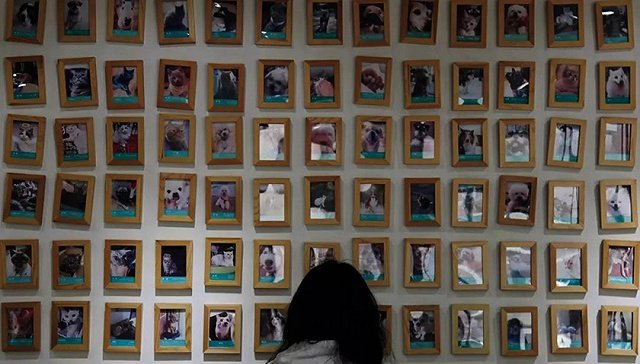Sometimes, after a long day of work, all we want is to have someone greet us when we get back home—a simple gesture that will take your fatigue away and make you feel that you are still loved by this world. Living in a metropolis floating upon so many ambitions and desires, it is hard to find the right one to share your life with. However, your life companion doesn’t have to be another human. More than 8% of Chinese people own at least one pet, and this community is continuing to grow. Many of these pet owners may start by just wanting to have a companion in their life, but they usually end up making a special connection with these living souls. This bond goes beyond the barriers of language and species and is an affection that leads many pet owners to introduce their pets as family members. Yet, there are still things such a bond can’t overcome, one of those being the difference in life spans between pets and pet owners. In most cases, the pet owner has to witness their animal friend age at a much faster pace than they do, and eventually wither away. It is only natural for pet owners to wish, when the time comes, for the once lively creatures who brought them countless cherished memories to be treated properly, decently, and with respect. The cruel truth, however, is that just like any industry, the funeral and interment business for pets is a jungle full of uncertain prospects, fraud, and risks, and regulation and supervision are still majorly absent.
After the last breath of life leaves their pet’s body, it can be tricky for owners to handle the remains since, according to the Animal Epidemic Prevention Law of China, you cannot bury animals before proper disinfection treatments undertaken and also most people don’t have a yard or property where they can inter their pet. Currently, Beijing Huanwei Company, tasked with looking after the city’s environment and hygiene, has set up around 800 stations across the city to accept animal corpses for pollution-free treatment. Since it is a government-funded service you won’t be charged. However, because the company also handles the remains of dead livestock and animal bodies from other sources, many pet owners find it emotionally unacceptable to send their deceased pets to these stations. And if you do decide to send your pet’s remains to one of these stations, you won’t be able to get any ashes or remains back.

But where there is a need, capital will follow. Over the past ten years, the field of start-ups related to pet interment has expanded rapidly, with around 1,200 new companies registered under this category last year alone, far exceeding the previous total growth for this industry. While the pet interment industry seems to have become a rising star, especially in first-tier cities, the boom of the industry also comes with controversies and risks. According to the Beijing Small Animal Protection Association, most of the vendors that offer pet funeral and interment services don’t have the corresponding license for this work. And as there is no industry standard to which to train the pet undertakers and related practitioners, most of them learn their skills from their more experienced colleagues. Yet you can easily find lists of such pet funeral businesses by searching for “pet interment” on Dianping, and the types of services offered by these places have increased over time, going from simple cremation to embalmment and the entire funeral, including recitation of sutras and burial. Some stores even allow you to take home a few accessories made from the ashes or fur of your beloved pet.

Of course, none of those services comes for free. The average expense at these locations can be as high as RMB 1,000. But even spending extra is not a guarantee that your pet will rest in peace, since profiteers are very good at finding ways to squeeze more profits from their customers. For example, most of these places won’t let their customers see the process of cremation, which means the ashes you get afterwards may not actually belong to your pet. Moreover, if you purchase a tomb in a so-called “pet cemetery,” things are likely not going to end well since most of these cemeteries are currently rented and renovated from orchards or farmlands, which is illegal and unauthorized. Not to mention what happens in the event the company goes bankrupt or disappears, in which case the cemetery would have to be demolished. This actually happened to a pet graveyard in Daxing not too long ago.

On the other hand, for people who aim to enter this industry the road is not an easy one to take either. Besides the difficulties in acquiring certification and training we have already talked about, simply finding or setting up a pet-specific crematorium may be a challenge for many companies because a lot of neighborhoods may not welcome such businesses. And the unprecedented pandemic that struck last year has made things even trickier, with a lot of practitioners finding themselves having fallen into a particular dilemma: While some people worry pet corpses will become a new source of infection, some pet owners are accusing the vendors of sending their pets to cremation without hosting a ceremony, even though a lack of ceremony is required due to pandemic prevention regulations.
All in all, the need for pet interment service won’t cease but will only continue to grow due to the growth of the pet owner community and people’s developing attitudes towards pet funerary services. It is necessary to reinforce supervision over this emerging industry, and to set up practical standards to better guide companies and practitioners. Better regulation and oversight will hopefully also help eliminate unscrupulous and unlicensed businesses from the industry, and restore the industry’s reputation. Meanwhile, more environmentally friendly services should be encouraged, such as printing out 3D models of a pet or opting for a tree or sea burial.

Ten to fifteen years may just be a phase in our human lives, but it can be the entire lifespan for our pets. Pet interment should be a meaningful business, since it not only escorts our animal friends along the last mile of their life, but also provides mental comfort for the owners in need and protects the environment as well as public health. Achieving these goals requires efforts from pet owners, business owners, and the government.
If we can’t have every living soul come to this world because of love, we can at least bid them farewell in peace.
Read: Should Dogs Get Served in Beijing’s Restaurants? A Debate Worth Barking Over
Images: 搜狐,悦藏艺术,新浪,界面新闻,钛媒体,天眼查,网易,重庆宠物火化,后印象馆
This is a place for show life about china, If these articles help you life better in china, Welcome to share this website to your friends, Or you can post questions about china life in FAQ, We will help you to find the right answer.






Recent Comments